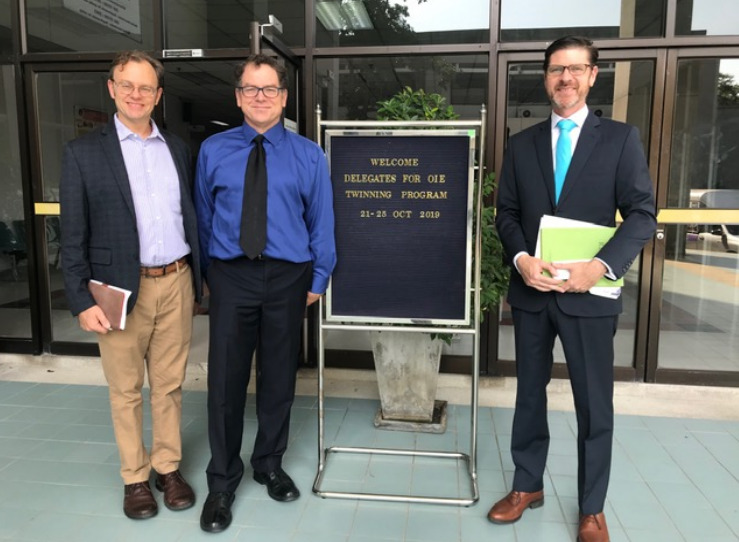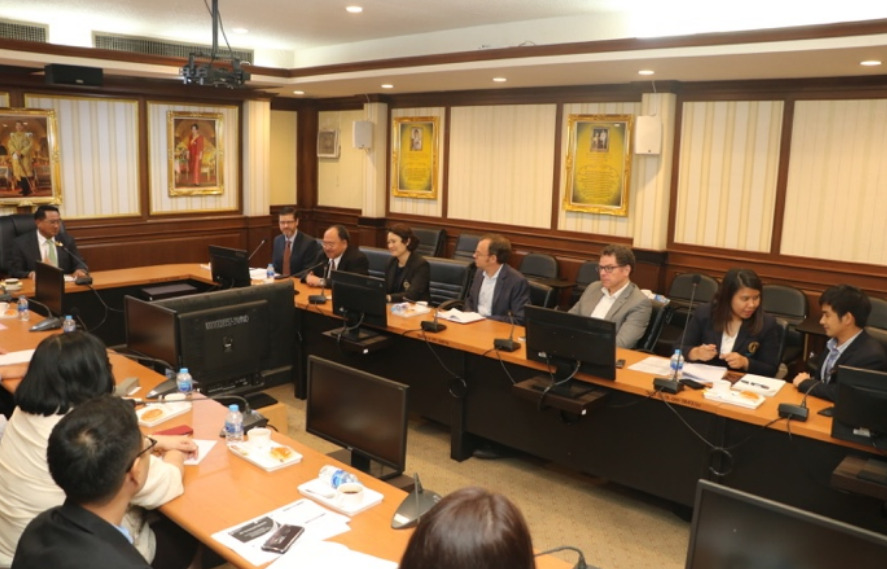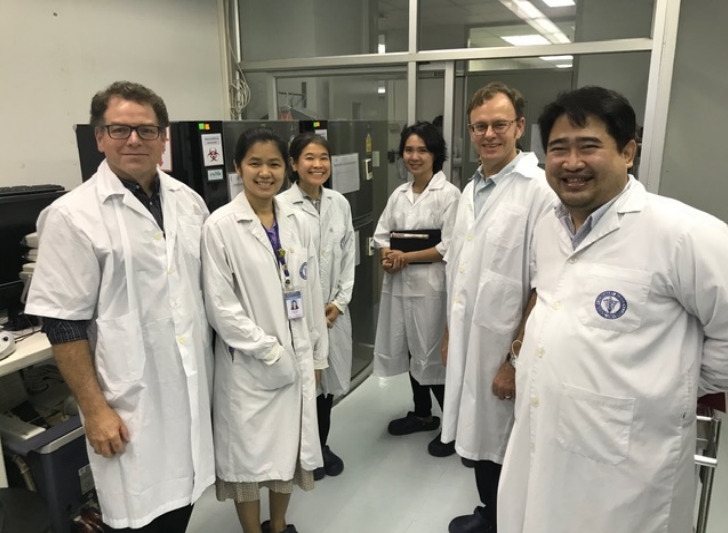The NWHC and the CWHC team visited the Thailand National Wildlife Health Center for the needs assessment to establish the OIE Twinning Project (Oct 2019). Photo Credit: Thailand-NWHC
October 2019 (Thailand) – The USGS National Wildlife Health Center (NWHC), in partnership with the Canadian Wildlife Health Cooperative (CWHC), as the WOAH Collaborating Centre Consortium for Wildlife Health and Biodiversity has entered into a formal twinning project arrangement with Mahidol University, Faculty of Veterinary Science, Thailand National Wildlife Health Center to assist in the establishment of a WOAH Collaborating Centre in Wildlife Health and Biodiversity at that institution.
To initiate the project, Drs. Jonathan Sleeman and David Blehert from the NWHC and Dr. Craig Stephen from the CWHC travelled to Bangkok, Thailand in the fall of 2019 to conduct an onsite needs assessment of the Thailand National Wildlife Health Center. The goal was to examine the current program, understand the future desired state (the future program as directed by institutional and national programmatic goals and objectives), and the needs and gaps in reaching the future desired state.
The NWHC, CWHC, and Thailand NWHC teams visited the Department of Livestock Development (DLD) and Department of National Parks, Wildlife and Plant Conservation (DNP), Thailand (Oct 2019). Photo Credit: Thailand DLD
Data for the needs assessment was gathered via a review of previously published risk assessment and disease prioritization reports and governmental agency strategic and implementation plans. During the visit, interviews with decision-makers, stakeholders, and key staff were performed to gather information on immediate concerns related to wildlife-associated pathogens and to understand how wildlife disease surveillance can be helpful.
Information was also gathered on the current functions and capabilities of the Thailand NWHC, what skills and capabilities are needed in the future, priorities for surveillance, and obstacles to success. Visits to current facilities and important field sites were also conducted to complete the picture regarding current capabilities and future needs. The needs assessment examined all aspects of the program, including diagnostic capabilities, applied epidemiology (risk assessment, outbreak investigation, surveillance design), health information management (databases, knowledge mobilization, decision support), harmonization and coordination (national-level planning, communication, partner networks, and SOP development), risk communication, applied research, disease management (response and interventions), and program management and administration (governance, financial and human resources, workforce development).
NWHC and CWHC team visiting the Monitoring and Surveillance Centers for Zoonotic Diseases in Wildlife and Exotic Animals (MoZWE) lab supporting Thailand-NWHC (Oct 2019). Photo Credit: Thailand-NWHC
The information gathered was used to develop a plan for training and capacity building to address the unmet needs and assist in the further development of the Thailand NWHC, with the ultimate goal for the Thailand NWHC to successfully apply for WOAH Collaborating Centre status in the sphere of competence of Wildlife Health and Biodiversity.
The visit was very successful and there was evidence of strong support at Mahidol University leadership levels for the program, and external stakeholders expressed support for the Center. The team found a good foundation of highly qualified personnel to deliver core services of a national center in place at Mahidol University. The next steps identified regarding training/capacity building fell into two main categories:
Planning has commenced for these two activities and the capacity building will be achieved through scientific exchanges with technical experts from the NWHC and CWHC visiting Mahidol University and the key individuals from Mahidol University spending time at the CWHC and NWHC. These scientific exchanges will be complemented with formal workshops, with contributions from the Wildlife Conservation Society.
All institutions are committed to the success of this project and we look forward to a long and productive working relationship that will enhance capacity in Thailand and the OIE Asia-Pacific Region to address the most urgent wildlife diseases that threaten human, animal and environmental health.
Written by:
Dr. Jonathan Sleeman
Center Director, USGS National Wildlife Health Center
Dr. Walasinee Sakcamduang
Dean, Mahidol University, Faculty of Veterinary Science



